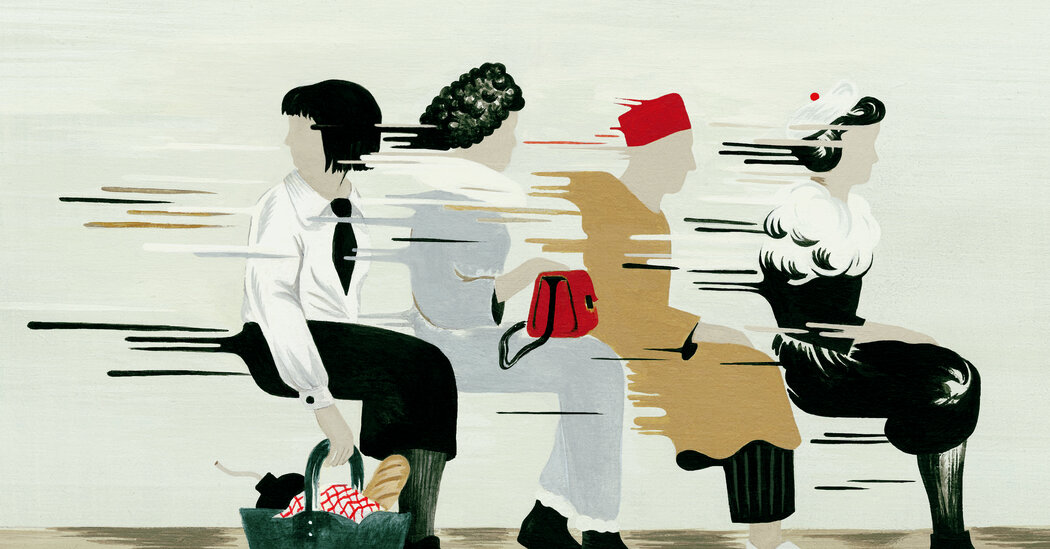by Emma Donoghue
“A railway carriage is as intimate as a dinner party, but one with no host and guests assembled at random.” You’ll find plenty of intimacy but few displays of party manners among the passengers Donoghue introduces in THE PARIS EXPRESS (Summit Books, 274 pp., $26.99), which takes place on a train departing from the Normandy coast in the autumn of 1895 with a bomb-toting anarchist aboard. Adding even more uncertainty to a dangerous situation is a flaw in young Mado Pelletier’s plan — “riding for hours in third class means getting familiar with these people before she has to kill them.”
Donoghue’s novel was inspired by an actual French railway disaster, and while she sketches convincing portraits of many of the real-life participants, she can’t resist adding some people “who could have been there” — including the American artist Henry Ossawa Tanner and the Irish playwright John Millington Synge — who were living in or near Paris at the time.
As the train speeds toward the capital, vignettes in the various carriages provide a tension-filled panorama of fin-de-siècle French society. We see the crew struggling to keep to an impossible schedule, the blue-collar crowd jostling and bickering in the cheap seats, even the pampered occupants of a lushly carpeted private car. And always in the background is our awareness of Mado’s homemade explosive, packed into a lunch pail, awaiting detonation.
by Chris Bohjalian
The true story of a wounded Union officer saved by a Confederate woman amid the shifting battle lines in the Shenandoah Valley was the subject of a magazine article Bohjalian published in 2003. Now, in THE JACKAL’S MISTRESS (Doubleday, 318 pp. $29), he returns to this historical material, adding imaginative twists to the original story line. In his telling, Libby Steadman has always been on shaky ground with her neighbors: When her father-in-law died, her husband, Peter, freed the family’s slaves. And although Peter fought for the rebel cause and now languishes in a Union prison camp, that principled act has led others to suspect his wife of less than ironclad loyalty.
Left to run her husband’s gristmill with an elderly Black couple who chose to remain there as employees, she seems mainly focused on sheer survival. But when Capt. Jonathan Weybridge is severely wounded in battle and left to die after the Union retreat, Libby feels honor bound to do for him what she hopes a Union woman would do for her husband.
Thus “the Jackal,” as Libby’s 12-year-old niece calls him, becomes a secret member of their household and a perilous friendship blossoms. The only safe refuge, 20 miles away, is the federal garrison at Harpers Ferry, but reaching it will require much subterfuge and even more luck. Not to mention an awareness that saving this life may well involve taking others.
by Olivia Wolfgang-Smith
If she’d been born in a different era, Vivian Lesperance “might have had a career as a battlefield general.” However, in Gilded Age New York she must be content to act as a clandestine commander. And so, as observed by the witty omniscient narrator of MUTUAL INTEREST (Bloomsbury, 320 pp., $28.99), Vivian escapes her stifling parents in stifling Utica by attaching herself to various well-connected women in Manhattan, achieving “fluency in New York’s native tongues — wealth, influence, fashion.” Yet despite the satisfactions of female companionship, she’s forced to realize that a secure future is more likely to be achieved by allying herself with a man.
Wolfgang-Smith has a great deal of fun tracking Vivian’s maneuvers as she marries Oscar Schmidt, an upwardly mobile but socially clueless businessman, then merges his interests with those of a former professional rival, Squire Clancy, the deeply eccentric scion of one of the city’s most prominent families. Conveniently, the men fall obsessively in love, leaving Vivian free to quietly pursue her own female conquests — and quietly run their increasingly profitable manufacturing empire. For years, this arrangement glides along very smoothly. But for how long? And at what personal cost? As Wolfgang-Smith’s narrator reminds us, “our subject is change.”
by Robert Seethaler
According to the newspapers, “a radiant future” is “rising from the morass of the past.” The inhabitants of the Vienna slum at the heart of Seethaler’s THE CAFÉ WITH NO NAME (Europa, 191 pp., $25) might beg to differ. Although World War II ended two decades earlier, the working-class patrons of the cafe run by a 30-ish war orphan named Robert Simon don’t seem to have emerged from its shadows. In fact, they’re content merely to have a place where “you can talk if you need to, or shut up if you’d rather.”
But in Katy Derbyshire’s translation from the German, this bare-bones establishment becomes a good deal more: a gallery of vibrant characters presented with an appealing blend of understated honesty and unsentimental warmth. “It was strange,” Robert observes, “how little information he had about them and yet how well he knew them.” Seethaler’s readers will feel the same way.
